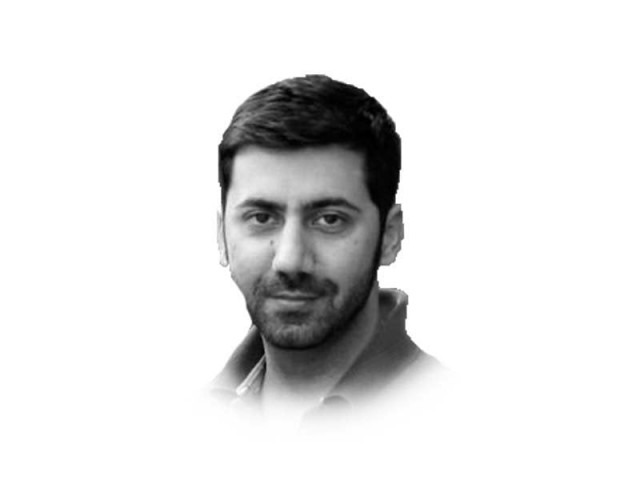Beyond civil-military trap
We have continued to neglect areas that are quintessential in democratisation project

The writer is a PhD candidate and Director of South Asia Study Group at the University of Sydney. He tweets @HNadim87
However, the idea is not to rob the civil-military issue of its significance in the democracy debate. The idea, in fact, is to examine civil-military issue beyond its binary restraints and go deeper into the subject as one of the many aspects of democratic failure in Pakistan, but not the only one. In our focus on democracy through a narrow and primitive civil-military lens, we have continued to neglect areas that are quintessential in democratisation project.
For instance, the single biggest challenge facing democracy in Pakistan that is seldom raised in the debate is the dysfunctional governance system across every sector. The fact that a well-endowed ECP is unable to conduct an election every five years without gross negligence is evidence of how damaging the ineffective governance is to democracy. While it is easy to blame the establishment and give it excessive agency for trying to rig the elections, the real question is, what stops successive civilian governments to pursue reforms and empower civilian institutions. Given especially that empowered civilian institutions are the foremost weapon of the civilian political governments to deter military intervention, the reluctance on the part of civilian political leadership to pursue reforms indicates a deeper level of contradiction. The problem is that institutional and governance reform is a twin-edged sword for the political elite given the political culture that thrives in the country.
Political culture in the form of a continuation of colonial patronage structure where both civil and military elite is beyond the discursive binary a single praetorian oligarchy is the second critical challenge to democracy in Pakistan. The deliberate and by design decay of institutions has allowed this praetorian oligarchy to consolidate its power over the populace. In a political culture where the constituents’ turn to their MNA/MPA for basic public service delivery, civil and military bureaucracy deeply distracted in privileges, it is the desperation of poverty-stricken public that allows the elite to exercise control. In such a scenario, institutional and governance reforms run directly contrary to the patronage structure that yields power to the political-military and bureaucratic elite. For the civilian political leadership, then, civil reforms is a complex bargain between establishing civilian supremacy and losing out its personal hold on domestic power in the process. Since it is impossible to have both, the civilian political leadership compromises on the reform agenda that allows it to retain control over its patronage structure but unable to deter the inroads of establishment in politics.
A similar situation exists within the political parties that are family based or dynasties. The tragedy of political dynasties is that they give more weight to a narrow definition of loyalty over competence that may allow political dynasties to retain power in the short term but in the long term the absence of competence and full-fledged democracy within the political party creates its own seeds of failure. The result is that there is no passage for competent and talented people to rise in the political ranks rendering the political parties unable to create a civilian political leadership that is able to deliver and take over space. Again for a political dynasty, it is a bargain between civilian supremacy and retaining family control over the political party. Democracy, therefore, suffers through a lack of democracy within the political parties that is perpetuated at the cost of poor governance and military supremacy in the country.
Third, and perhaps most recently-emerging challenge to democracy, is the advent of technology. Again, this aspect is overlooked in our conversations given the debate on democracy is so heavily loaded with civil-military tussle. The way fake news is discrediting institutions, political opponents, media freedom and radicalising the public presents existential crisis for democracy that needs to be taken seriously, at least by the opinion-makers and experts on democracy if not politicians.
The fact that our debate on democracy is deeply primitive and unable to progress to a more sophisticated discourse that takes into question this diverse set of challenges facing democracy is no accident. It is, in reality, a failure of our academic and intellectual elite that refuses to acknowledge and in some cases snub the diversity and depth in the debate on democracy for a set of convenient self-created myths on what hinders democracy in Pakistan. The sooner we are able to diversify and delve deeper into the debate on democracy, the better we will begin to see beyond the civil-military facade to realise that this praetorian oligarchy has found comfort in a strange undemocratic bargain that stands to benefit both; civilian political elite to retain its patronage structure, and establishment to expand its privilege. As for the future of democracy in Pakistan, it will remain a hostage to this elite bargain and to the academic debate that is unable to look beyond the superficial civil-military binary.
Published in The Express Tribune, January 15th, 2019.
Like Opinion & Editorial on Facebook, follow @ETOpEd on Twitter to receive all updates on all our daily pieces.














COMMENTS
Comments are moderated and generally will be posted if they are on-topic and not abusive.
For more information, please see our Comments FAQ